 Our History and Future
Our History and Future
-
1972〜Founding period
In 1972, the predecessor of Watari Co., Ltd., Watari Shokai Co., Ltd., was established. Amid the economic turmoil of Japan, including the first negative postwar economic growth in 1973, Watari Co., Ltd. was founded in 1974, laying the foundation for its current domestic business operations. During the 1980s, as Japan’s economy expanded through rapid and stable growth, our company also grew, establishing a base in Hokkaido (now the Hokkaido Branch) and relocating the Headquarters to accommodate business expansion.
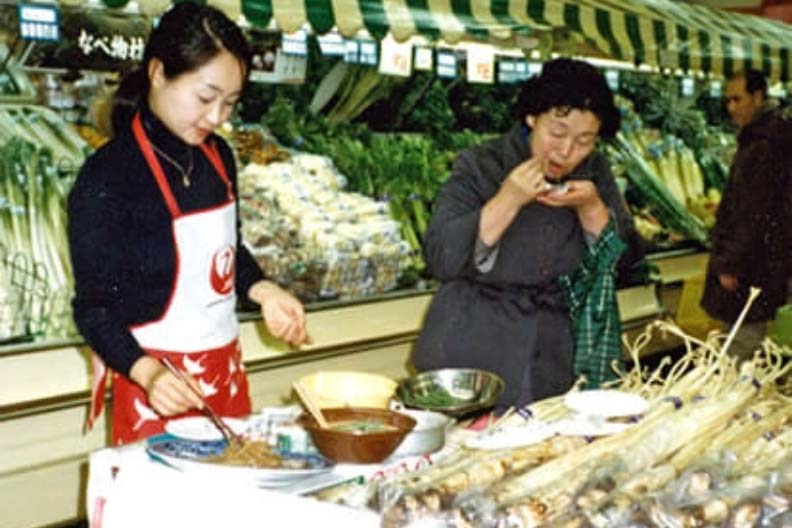
1981: Promotional activities at Sapporo Tokyu Store 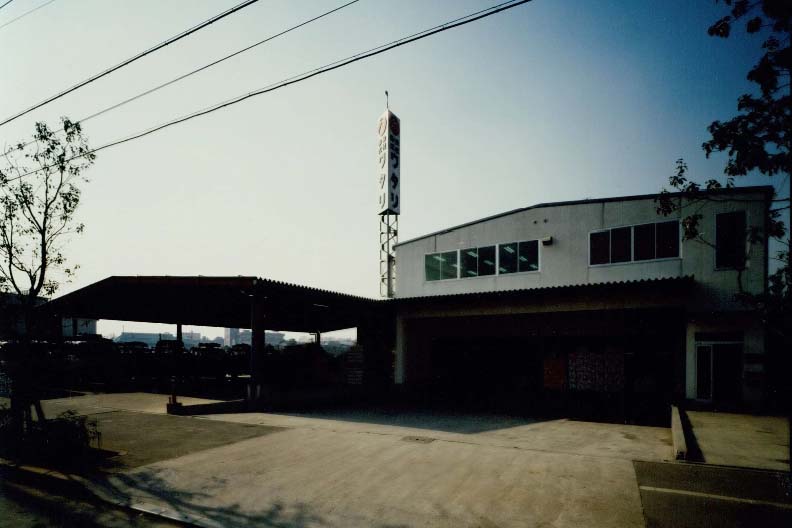
1986: Headquarters relocated to Shiraitodai - 1972 (May)
- Watari Shokai Co., Ltd. was established.
- 1974 (Apr.)
- Watari Shokai Co., Ltd. was reorganized, establishing Watari Co., Ltd. Headquarters was established in Mitaka City, Tokyo.
- 1975 (Nov.)
- Headquarters was relocated to Chofu City, Tokyo.
- 1976 (Sep.)
- Started importing matsutake mushrooms.
- 1981 (Oct.)
- Opened Sapporo Sales Office in Shiroishi Ward, Sapporo City, Hokkaido.
- 1986 (Oct.)
- Relocated Headquarters to Shiraitodai, Fuchu City, Tokyo.
Historical Background and Events of the Time
- 1972
-
- Normalization of diplomatic relations between Japan and China
- Reversion of Okina to Japan
- The Oil Crisis
- 1973
-
- The Yom Kippur War
- The end of the Vietnam War
- 1977
-
- Signing of the Egypt-Israel Peace Treaty
- 1979
-
- Iranian Revolution
- The Sino-Vietnamese War
- 1980
-
- Soviet invasion of Afghanistan
- 1981
-
- Attempted assassination of President Reagan
- 1983
-
- U.S. military intervention in the Lebanese Civil War
- 1986
-
- Chernobyl nuclear power plant accident
- Emperor Hirohito passed away, marking the end of the Showa era.
-
1987〜Transformation Period
From 1990s to 2000s, we strengthened our procurement of imported fresh produce, seeking new products and new production regions overseas. After 2000, pesticide residue issues of Chinese vegetables occurred, leading to increased public criticism of imported fresh produce. Our company also suffered significantly from this event. To solve pesticide residue issues in imported fresh Okra, we established a local sbusidiary, Greenstar Produce Phillippines Inc. in 2007 to produce and export safe quality Okra for Japan.
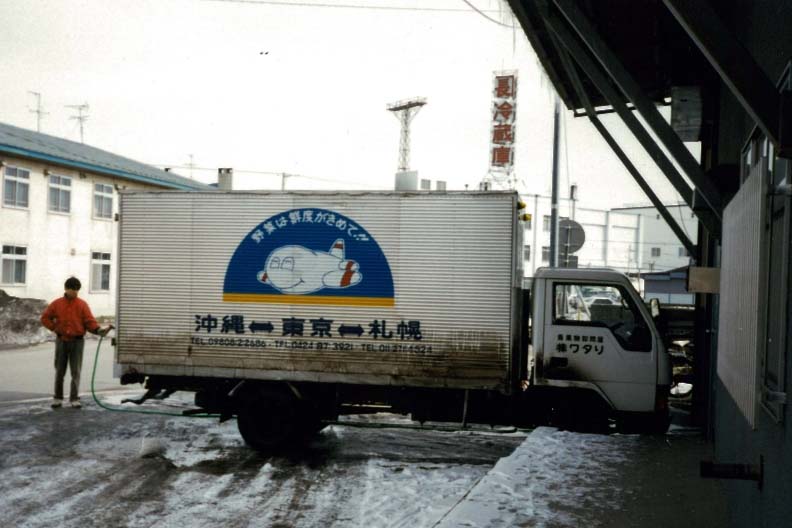
1989: Our truck photographed in Sapporo (Okinawa-Tokyo-Sapporo) 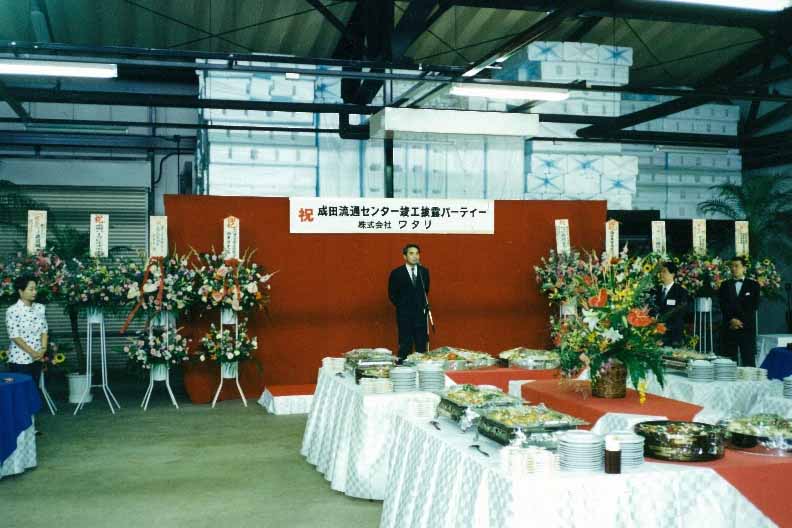
1995: Opening of Narita Distribution Center 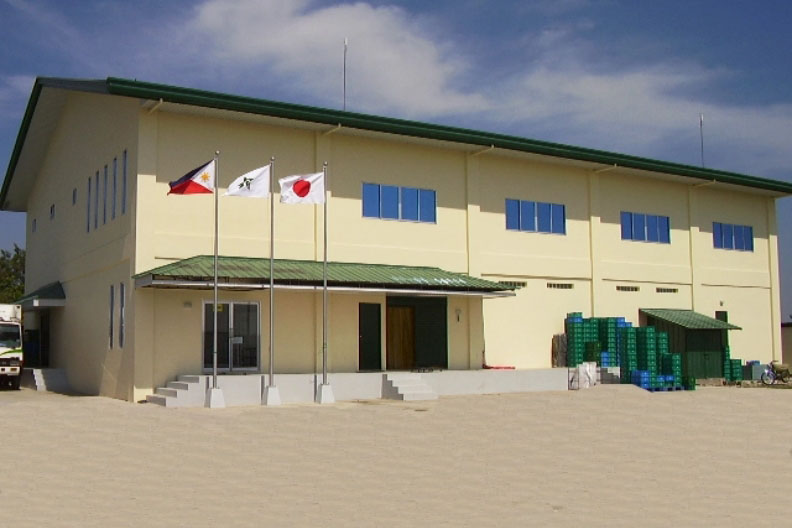
2007: Establishment of Green Star Produce - 1991 (Dec.)
- Kobe Sales Office was opened in Chuo Ward, Kobe City, Hyogo Prefecture.
- 1995 (Aug.)
- Narita Distribution Center was opened in Tomisato City, Chiba Prefecture.
- 1996 (Jun.)
- Capital was increased to 98 million yen.
- 1997 (Jul.)
- Sapporo Sales Office was relocated to Omagari Industrial Park, Kitahiroshima City.
- 2000 (Jun.)
- The Shinjuku Office was opened in Shinjuku City, Tokyo.
- 2000 (Dec.)
- A part of Domestic Department was separated from the Headquarters to establish Watari Seika Co., Ltd.
- 2001 (Mar.)
- Headquarters and Shinjuku Office were relocated and consolidated in Miyamachi, Fuchu City, Tokyo.
- 2002 (Dec.)
- Watari Seika Co., Ltd. opened Okinawa Sales Office in Ginowan City, Okinawa Prefecture.
- 2003 (Oct.)
- Kobe Sales Office was reorganized as the Kansai Branch.
- 2007 (May)
- Establishment of Greenstar Produce Phils. Inc.
- 2007 (Jun.)
- Narita Sales Department was relocated to Fuchu City, Tokyo, as the Tokyo Sales Office.
- 2007 (Nov.)
- Watari Seika Co., Ltd. opened Kochi Sales Office in Kochi City, Kochi Prefecture.
Historical Background and Events of the Time
- 1987
-
- The Tiananmen Square Incident in China
- 1988
-
- The Soviet withdrawal from Afghanistan
- 1989
-
- The fall of the Berlin Wall
- 1990
-
- The reunification of East and West Germany
- The collapse of the Soviet Union
- Emperor Akihito ascended to the throne, marking the beginning of the Heisei era.
- 1991
-
- The outbreak of the Gulf War
- The bursting of the economic bubble in Japan
- 1995
-
- The Tokyo subway sarin attack by Aum Shinrikyo
- 1997
-
- The handover of Hong Kong to China
- 1999
-
- The outbreak of the Kosovo Conflict
- 2001
-
- The September 11 attacks in the United States
- The U.S. invasion of Afghanistan
- 2003
-
- The U.S. invasion of Iraq
- 2004
-
- The SARS outbreak in China
- 2006
-
- The outbreak of the Lebanon Conflict
-
2007〜2nd Founding Period
Amid the global recession triggered by the global financial crisis, our current president took office in 2007. After assuming leadership, efforts were made to improve productivity by introducing new equipment and renovating facilities. Additionally, we developed and promoted Nebaristar to create added value in fresh produce in collaboration with producers. In 2015, we formulated the Watari Group’s five-year medium-term management plan, initiating organizational and sales force enhancements as part of broader management reforms.
- 2008 (Feb.)
- Sapporo Sales Office was relocated to Higashi Ward, Sapporo City, Hokkaido.
- 2008 (Apr.)
- Okinawa and Kochi sales offices of Watari Seika Co., Ltd. were transferred to Watari Co., Ltd.
- 2009 (Mar.)
- Kochi Sales Office was closed.
- 2009 (Jul.)
- Sapporo Agricultural Center was established in Nishi Ward, Sapporo City, Hokkaido.
- 2011 (Sep.)
- Siam Agrostar Co., Ltd. was established in Thailand.
- 2011 (Sep.)
- The trademark for Nebaristar was successfully registered.
- 2012 (Dec.)
- Sapporo Agricultural Center was relocated to Higashi-Nopporo Town, Ebetsu City, Hokkaido (and renamed the Ebetsu Agricultural Products Center).
- 2014 (Jul.)
- Tokyo Sales Office was relocated to Shinjuku City, Tokyo.
- 2015 (Apr.)
- The First Five-year Medium-term Management Plan was announced.
- 2015 (Nov.)
- Watari Asia Co., Ltd. was established in the Philippines.
- 2017 (Mar.)
- Sapporo Sales Office introduced a commercial food waste disposal machine.
- 2017 (Apr.)
- Reorganization of sales offices in Japan
Tokyo Sales Office was reorganized as the Tokyo Branch.
Kansai Branch Office was reorganized as the Kobe Branch.
Sapporo Sales Office was reorganized as the Hokkaido Branch.
Okinawa Sales Office was reorganized as the Okinawa Branch. - 2018 (Jan.)
- A shrink-wrap packaging machine line was introduced at the Ebetsu Agricultural Products Center.
- 2018 (May)
- Siam Agrostar Co., Ltd. in Thailand was closed.
Historical Background and Events of the Time
- 2008
-
- The global financial crisis occurred.
- 2010
-
- The Sichuan earthquake occurred in China.
- 2011
-
- The Great East Japan Earthquake occurred.
- The tsunami caused by the Great East Japan Earthquake led to an accident at the Fukushima Daiichi Nuclear Power Plant.
- 2012
-
- The civil war in Syria began.
- 2015
-
- The Islamic State carried out coordinated terrorist attacks in Paris.
- The United Kingdom decided to leave the European Union.
- 2017
-
- The United States launched military operations against the Islamic State in Syria.
- 2019
-
- Pro-democracy protests began in Hong Kong.
- Emperor Naruhito ascended to the throne, marking the beginning of the Reiwa era.
-
2020〜Growth Period
We have embarked on a journey to transform ourselves from a coordinator connecting production areas and consumption areas into an innovator & creater of new added value for fresh produce to become a truly unique company. As we celebrate our 50th anniversary in 2022, we will continue to aim for a new version of Watari, unconstrained by past successes and fixed ideas, adapting to the times and circumstances.
- 2020 (Mar.)
- The trademark for Toro-okra was successfully registered.
- 2020 (Apr.)
- The Second Five-year Medium-term Management Plan was announced.
- 2020 (May)
- The trademark for Satsuki was successfully registered.
- 2020 (Aug.)
- A digital assortment system was introduced at the Okinawa Branch.
- 2020 (Dec.)
- Watari Asia Co., Ltd. in the Philippines was closed.
- 2021 (Apr.)
- A promotional website titled For Your Healthy Life was launched.
- 2021 (Oct.)
- A productivity improvement management system was introduced at the Ebetsu Agricultural Products Center.
- 2021 (Dec.)
- The company was certified as a vegetable supporter of the Let’s Eat Vegetables project.
- 2022 (Jan.)
- The Narita Distribution Center obtained JFS-A certification.
- 2022 (Feb.)
- Hokkaido branch acquired JFS-B standard certification
The Ebetsu Agricultural Products Center obtained JFS-A certification. - 2022 (Dec.)
- A pillow packaging machine line was introduced at the Hokkaido Branch.
- 2023 (Feb.)
- A semi-automatic binding machine line was introduced at the Ebetsu Agricultural Products Center.
- 2024 (Apr.)
- The Sales Planning Department was renamed the Sales Promotion Planning Department.
Historical Background and Events of the Time
- 2020
-
- The COVID-19 pandemic spread globally.
- The Tokyo Olympics were postponed.
- 2021
-
- The COVID-19 pandemic continued to spread.
- The Tokyo Olympics were held.
- 2022
-
- Russia invaded Ukraine.
- A global food crisis occurred.
- A global inflation crisis occurred.
- 2024
-
- A magnitude 7 earthquake struck Ishikawa Prefecture.
- The Bank of Japan lifted the negative interest rate policy.
- Vladimir Putin secured a landslide victory in the Russian presidential election.
- Prime Minister Kishida stepped down, and the Ishiba Cabinet was inaugurated.
- Israel launched a retaliatory attack on Iran.
The Future of Watari Thoughts for the future

Being close to both producers and consumers,
Watari is delicated to supporting the sustainability of agriculture.
At Watari, we have always been dedicated to delivering fresh produce that remains delicious until the last bite, even after reaching end-consumers. This commitment will not change in the future. In addition, we believe that creating new value for fruit and vegetables is Watari’s mission, given the current times.
The decrease in agricultural population due to the aging of farmers and lack of successors is an urgent issue that cannot be solved by measures for an aging population and declining birth rate alone. To protect Japanese agriculture, we must prepare the environment for sound agricultural management, increase the number of young farmers, and ensure that fresh produce will be given new value for not being judged solely by price.

Contributing to agriculture and food culture through our comprehensive management of fresh produce distribution”
With development of information technology, the additional information such as farmers’ photos and profile, new recipes and best way of storage have enriched the food culture for consumers in their new lifestyle. To move forward, we need to create new value to fresh produce by disseminating more attractive information about each item of fresh produce by collaborating with production areas, growers and retailers. Watari aims to achieve this goal as a leader in the industry and contribute to agriculture and food culture in Japan.